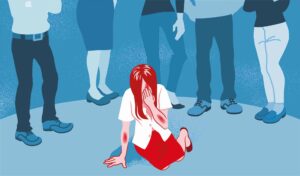Did you know that one in 40 adults has OCD? This means that many people are living with this mental illness and dealing with the stigmas that come along with it. In this blog post, we will discuss some common myths about OCD and provide facts to help dispel them. We hope that this information will help to reduce the OCD stigmas and encourage those who are struggling to seek out help.
Contents
What Are OCD Stigmas?
 OCD stigmas are basically any preconceived notions or judgments that people tend to make about those with OCD. Unfortunately, there are many myths and misinformation about OCD, which can lead to unfair stereotypes and discrimination.
OCD stigmas are basically any preconceived notions or judgments that people tend to make about those with OCD. Unfortunately, there are many myths and misinformation about OCD, which can lead to unfair stereotypes and discrimination.
In a general sense, stigmas around mental health are an issue that needs to be addressed. A mental health stigma is a form of discrimination and it’s something that can stand in the way of people getting the help they need. For example, someone might not seek treatment for their OCD because they’re afraid of being seen as “crazy” or “weird.”
Moreover, OCD stigmas are such as common mental illness, it’s important to be mindful of the way we talk about it. The way we talk about mental illness can have a big impact on how people perceive and understand it. For example, using phrases like “I’m so OCD” to describe someone who is neat and tidy is dismissive and insulting. It perpetuates the idea that OCD is nothing more than a quirk or personality trait when in reality it’s a serious mental illness.
If you think about it, we wouldn’t use phrases like “I’m so cancerous” or “I’m so diabetic” to describe someone. So why is it okay to use OCD in this way? It’s not. We need to be more mindful of the language we use when talking about mental illness and do our part to help reduce the stigma.
What Are Some Facts About OCD?
It is important for people to know that OCD is a real mental disorder and it is not something that people can just snap out of. Here are some facts about OCD:
Affects both men and women equally
There has been a misconception that OCD is only about being clean or organizing things but it is much more than that. People with OCD can have thoughts that are intrusive and cause anxiety. In order to relieve the anxiety, they will perform certain behaviors or rituals. For example, someone with contamination OCD might avoid public places because they fear getting sick. Or, someone with symmetry OCD might have to check the locks on their doors several times before they leave the house.
OCD can be treated
It is not uncommon for people with OCD to feel like they will never be able to get better but that is not the case. OCD can be treated with therapy and medication. If you or someone you know is struggling with OCD, please reach out for help. Although it is to be believed that OCD cannot be cured, it can go into remission which means that the symptoms are no longer present. But yes, people with OCD can and do get better.
Begins in adolescence or young adulthood
 It is believed that OCD is caused by a combination of genetic and environmental factors. There is no single cause of OCD. OCD often runs in families, but it is not clear how much is due to genes and how much is due to a shared family environment or upbringing. But there are some genetic factors to develop OCD in adolescence. It begins in adolescence or young adulthood. However, it can develop in childhood as well. It is not contagious and cannot be caused by something you have done.
It is believed that OCD is caused by a combination of genetic and environmental factors. There is no single cause of OCD. OCD often runs in families, but it is not clear how much is due to genes and how much is due to a shared family environment or upbringing. But there are some genetic factors to develop OCD in adolescence. It begins in adolescence or young adulthood. However, it can develop in childhood as well. It is not contagious and cannot be caused by something you have done.
OCD is a chronic condition
Many people think that OCD is a phase that people go through. This is not the case; OCD is a chronic, long-lasting condition. People with OCD may have periods of remission, but the symptoms will always come back. In fact, this is one of the distinguishing features of OCD: the symptoms are not permanent, but they are also not controllable. Thus, it is important for people to understand that OCD is a real and serious condition.
OCD is not just about being tidy
Another common misconception that people have about OCD is that it’s all about being clean or tidy. While some people with OCD may obsess over germs and dirt, and others may compulsively organize their belongings, there are many other types of OCD obsessions and compulsions. People with OCD can obsess over just about anything, including their own thoughts, feelings, or actions. And while some compulsions may involve cleaning or organizing, others may involve repetitive behaviors like counting, checking, or tapping.
People do not choose OCD
People with OCD do not choose to have the disorder. It is not something that they can simply “snap out of.” OCD is a real and serious mental illness that can cause significant distress and impairment in many areas of life. For some people, OCD can be so severe that it completely takes over their lives.
So, these are some common myths and facts about OCD. Remember, if you or someone you know is struggling with OCD, there are treatment options available. OCD is not curable, but it is treatable. With proper treatment, many people with OCD are able to live happy and healthy lives. You just need to reach out for help.
How Do OCD Stigmas Sound Like?
 It is believed that OCD stigmas usually come from a lack of understanding of the condition. People who don’t have OCD may think that people with OCD are just “quirky” or “eccentric.” They may not understand that OCD can be a serious and debilitating condition.
It is believed that OCD stigmas usually come from a lack of understanding of the condition. People who don’t have OCD may think that people with OCD are just “quirky” or “eccentric.” They may not understand that OCD can be a serious and debilitating condition.
OCD stigmas can also come from people with OCD themselves. In fact, people with OCD are often their own worst critics. They may believe that they are “crazy” or “weird.” This can lead to a lot of shame and isolation. So, how does it sound like when someone has an OCD stigma?
Stigma from others sounds like:
- “You’re just being paranoid.”
- “You’re overthinking things.”
- “It’s not a big deal.”
- “I do not feel comfortable discussing this with you.”
- “You’re just making excuses.”
- “Mental illness makes people weak.”
- “I don’t want to catch whatever you have.”
Stigma from self sounds like:
- “I’m so stupid.”
- “Why can’t I just stop?”
- “I’m such a freak.”
- “Nobody will ever understand me.”
- “I’ll never be good enough.”
- “Nobody will ever love me.”
OCD stigmas can be hurtful and damaging. It can be really difficult to manage this condition. But, it is important to remember that you are not alone. There are many people who understand what you’re going through and there is help available. If you or someone you know is struggling with OCD, please reach out for support. With time and help, it is possible to manage this condition and live a fulfilling life.
How Does It Impact Life?
 There are several negative impacts of OCD stigmas on people’s lives. Some of the consequences are listed below:
There are several negative impacts of OCD stigmas on people’s lives. Some of the consequences are listed below:
Social isolation and loneliness
This seems very counter-intuitive since people with OCD are often described as “perfectionists” or “overly conscientious.” However, the constant fear of being judged and ridiculed by others for their compulsions can lead to social isolation and loneliness. In fact, other people’s reactions are one of the main reasons why people with OCD do not seek treatment. Also, the shame and embarrassment associated with the disorder can make it hard to maintain friendships and romantic relationships.
Low self-esteem and poor body image
Many people with OCD have low self-esteem and a poor body image. This is often due to the fact that they are constantly comparing themselves to others (e.g., “I’m not good enough,” “I’m not clean enough,” etc.). More often, people with OCD are also hard on themselves due to the constant negative thoughts and emotions that they experience. According to studies, OCD can also lead to eating disorders such as anorexia nervosa and bulimia nervosa. Because of the constant need to “be perfect,” people with OCD often put unrealistic demands on themselves, which can lead to a lot of stress and anxiety.
Difficulty in maintaining relationships
The stigmas associated with OCD can also make it difficult for people to maintain relationships. For example, someone with OCD might avoid going on dates or participating in social activities because they are afraid of being judged by others. In addition, the constant need for things to be “just so” can often lead to arguments and conflict with others. In fact, there have been studies that show a link between OCD and domestic violence. Because one partner seems to be always “needing” or “asking” for something, it can often lead to resentment and frustration, which can eventually turn into violence.
Depression and anxiety
OCD stigmas can also lead to depression and anxiety. This is because people with OCD are constantly worrying about being judged or ridiculed by others. Also, studies have found that people with OCD are more likely to have anxiety and depression. The main reason behind this is that OCD stigmas can make it difficult for people to live a “normal” life. Moreover, depression and anxiety are something that people with OCD have to deal with on a daily basis.
Treatment avoidance
 The stigma surrounding OCD can also lead to people avoiding treatment. This is because they might be afraid of being seen as “crazy” or “different.” In addition, they might worry that others will find out about their disorder and judge them. As a result, people with OCD might not get the treatment that they need, which can make their condition worse. Also, it is been found that people with OCD are more likely to commit suicide than those without the disorder. However, this could be due to the fact that OCD stigmas make it difficult for people to seek help.
The stigma surrounding OCD can also lead to people avoiding treatment. This is because they might be afraid of being seen as “crazy” or “different.” In addition, they might worry that others will find out about their disorder and judge them. As a result, people with OCD might not get the treatment that they need, which can make their condition worse. Also, it is been found that people with OCD are more likely to commit suicide than those without the disorder. However, this could be due to the fact that OCD stigmas make it difficult for people to seek help.
So, as you can see, OCD stigmas can have a significant impact on people’s lives. If you or someone you know has OCD, it is important to seek professional help. There are many effective treatments available that can help people manage their symptoms and lead a normal life. Remember, you are not alone!
How To Overcome OCD Stigmas?
It is important to be aware of the stigmas surrounding OCD so that you can be more understanding and less judgmental of those who live with the disorder. There are a few things that people can do to overcome the stigmas:
Talk openly
The more people talk about their experiences with OCD, the more normalized it will become. This can help to reduce the shame and secrecy that surrounds the disorder. Also, if you have OCD, it can be helpful to share your story with others so that they can understand what you’re going through. You can even talk about your experiences on social media using the hashtag #endOCDstigma.
Educate yourself and others
Many people don’t know much about OCD, so they may not realize that their words or actions could be hurtful. By educating yourself and others about the disorder, you can help to reduce the stigma. There are several excellent resources about OCD, such as books, websites, and support groups. You just need to be willing to seek them out.
Challenge your own beliefs
If you have negative beliefs about OCD, it can be helpful to challenge them. For example, if you believe that people with OCD are “crazy” or “weird,” try to remember that these are just stereotypes. Everyone is different, and no one deserves to be judged based on their mental health diagnosis. It is also important to remember that OCD is a real and serious mental illness.
Be mindful of your words and actions
If your loved one or even you suffer from OCD, know that it is a real mental illness. It is not something to be taken lightly or joked about. Be mindful of your words and actions around those who suffer from OCD. Also, you should know that OCD is not contagious. You cannot “catch” it from someone else. For example, you can’t catch OCD from shaking someone’s hand who has it. So, don’t be afraid to show physical affection or be around someone with OCD. Just remember to be respectful and understanding.
Seek professional help and support
 It is important to seek professional help if you think you might be struggling with OCD. A mental health professional can help you understand your thoughts and feelings, and work with you to develop healthy coping mechanisms. There are also many support groups available for people with OCD, which can provide valuable social and emotional support.
It is important to seek professional help if you think you might be struggling with OCD. A mental health professional can help you understand your thoughts and feelings, and work with you to develop healthy coping mechanisms. There are also many support groups available for people with OCD, which can provide valuable social and emotional support.
The most common treatment for OCD is ERP, which stands for Exposure and Response Prevention. This treatment involves gradually exposing yourself to the things that trigger your OCD. While learning to resist the urge to perform compulsions. ERP can be very effective, but it can also be challenging and requires a lot of commitment.
If you or someone you know is struggling with OCD, please don’t hesitate to seek help. There is no shame in seeking treatment, and with the right help, recovery is possible.
Conclusion
To conclude OCD stigmas are usually based on a lack of understanding and knowledge about the condition. It is important to remember that OCD is a real mental health disorder that can be extremely debilitating for sufferers. If you know someone with OCD, be supportive and understanding – they are dealing with a lot more than just “being tidy” or “liking things in order”.
OCD stigmas are harmful and only serve to further isolate and stigmatize those who suffer from this condition. Therefore, you should be mindful of the language you use when talking about OCD and be an advocate for an accurate representation of this disorder.
If you or someone you know is struggling with OCD, there are many resources available to help. You can also contact Therapy Mantra, an online counseling and therapy service. The experts here are ready to talk to you about your unique experiences with OCD and help you develop a treatment plan that works for you. So don’t hesitate to reach out and get the help you need. You can book a free therapy or download our free OCD treatment app on Android or iOS.


